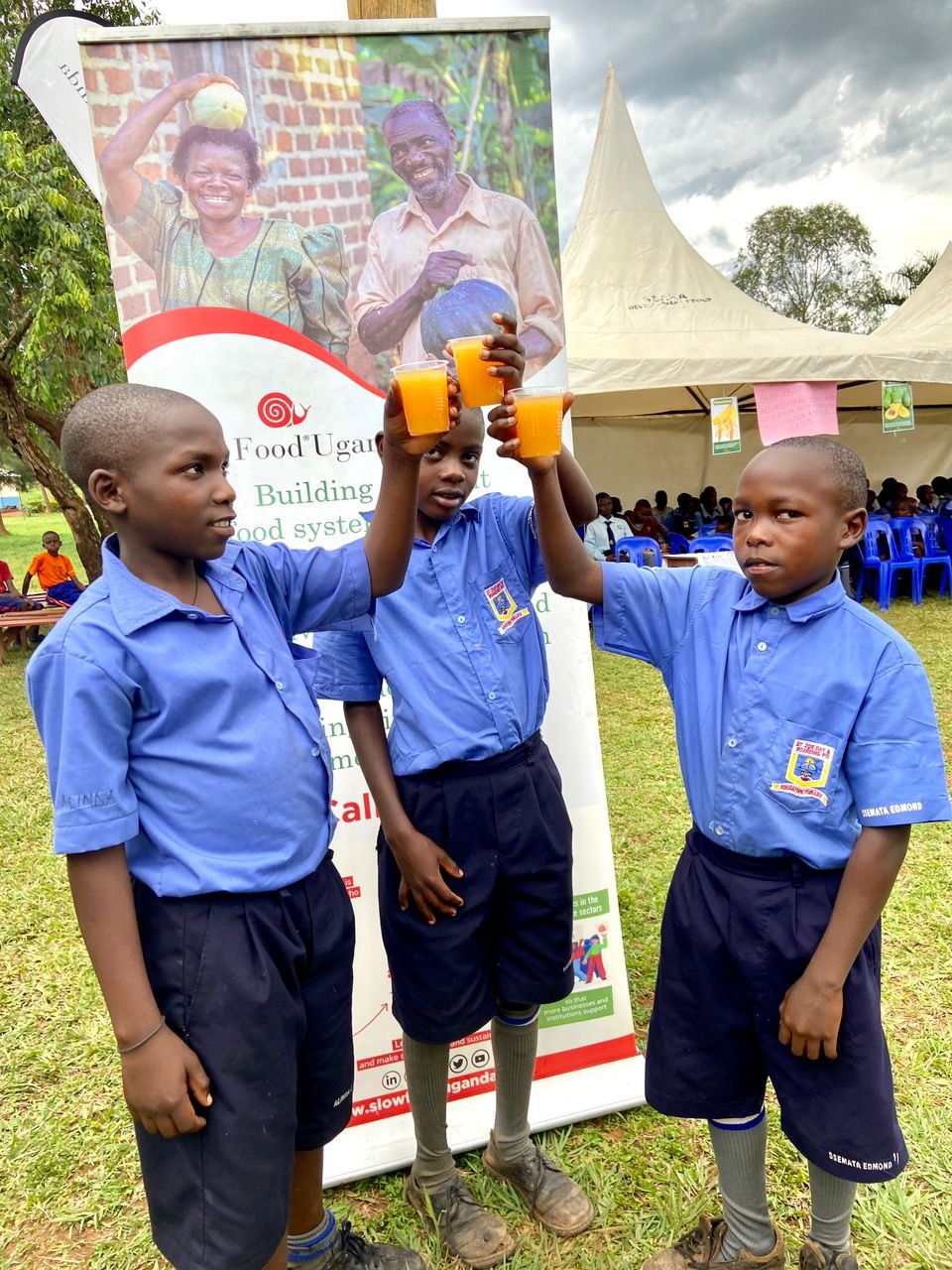SLOW FOOD UGANDA HOSTS FRUIT AND JUICE PARTY AT ST. ZOE PRIMARY SCHOOL
One of the prevailing challenges encountered by school-going children rotates around the consumption of ultra-processed beverages as opposed to nutritious local fruit juices within school environments. Ultra-processed beverages, often concentrated with artificial additives, excessive sugars, and preservatives, present significant drawbacks compared to their healthier counterparts. Such beverages lack essential nutrients vital for children’s growth and development, leading to concerns regarding their overall nutritional intake. The usual consumption of these processed options contributes to adverse health outcomes, including obesity, dental issues, and a heightened risk of chronic diseases later in life.
To address these challenges, Slow Food Uganda organized the Annual Fruit and Juice Party at St. Zoe Primary School in the Mubende district on April 4th, 2024, to raise awareness about the importance of nutritious dietary choices and to promote access to wholesome alternatives with the aims to stimulate the production and consumption of native fruits within Ugandan schools.
The event brought together over 200 people, including students from eight selected schools, teachers, parents, inspectors of schools, CSO partners, and community members, for a celebration of local fruits and healthy refreshments. The event fostered a sense of unity and shared purpose in promoting healthier eating habits among the children.
The event flavoured with vibrant colors and delicious aromas of different indigenous fruits served as a platform to educate children and adults alike about the nutritional benefits of incorporating fruits into their diets. Attendees were treated to an array of fresh fruits sourced from local farms and plantations, including juicy mangoes, oranges, pineapples, sugarcane, pawpaw, and sweet bananas among others. Several fruits were turned into refreshing juices, highlighting the versatility and deliciousness of Uganda’s fruit diversity.
The fruit and juice party saw participants especially students and pupils from the eight schools engaged in meaningful discussions which included debating competitions and panel discussions about the importance of local fruits in promoting nutritious diets and overall health and well-being. Through the above educative sessions, learners showcased debating skills which impressed participants praising their maturity of their understanding of the theme of the day.
Monica Nabaasa, the program officer of education at Slow Food Uganda also the event manager while opening up the 11th edition of the fruit and juice party expressed the need for every school to have fruit trees in their school compound to not only help in fruit consumption but also climate change adaptation. “We also request all the School Administrators to incorporate fruits on the menu they feed learners and once this is done children will be nourished and improve their academic performance”. Monica said
During the event, Learners physically got involved in preparing juice of different types while performing melodies of songs and poems that raised awareness to the public on the values of local fruit juices over processed and imported juices on the market today. A chance to taste the nutritious juice made with their hands praising the aroma of the diverse made out of indigenous fruits.
The Fruit and Juice party was attended by the Mubende district inspector of Schools who represented the District Education Officer as the Guest of honor. Through his speech, he observed the fact that the Function feets the DEO’s innovation which propelled all Schools in Mubende district to have demonstration School Gardens to protect the land from grabbers when he resumed the office of the DEO in Mubende district. He thanked Slow Food Uganda for partnering with the district and other similar partners like Homeland Organic and Kyofa to help make his idea come true.
In addition to enjoying the delicious fruits, guests were treated to freshly squeezed juices made on-site from the same fruits. The refreshing beverages provided a healthy alternative to sugary sodas and everyone was encouraged to stay hydrated while indulging in the festivities.
The Fruit and Juice Party also served as a platform for dialogue and collaboration among various stakeholders committed to promoting food and nutrition security in the community. Representatives from local government, agricultural organizations, and other community partners shared insights and initiatives to improve access to healthy food and empower local producers.
As the day ended, participants left with satisfied taste buds and a deeper appreciation for the abundance of nutritious foods available in their communities. Slow Food Uganda’s Fruit and Juice Party at St. Zoe Primary School exemplified the organization’s mission to celebrate food culture, promote sustainable practices, and build stronger, healthier communities.
Since 2013, Slow Food Uganda has been organizing the Fruit and Juice Party annually in diverse school settings and regions of the country. The event remains dedicated to promoting biodiversity, education, and networking. Through a series of activities engaging teachers, students, and Slow Food members, the initiative aims to advance the cultivation and consumption of indigenous, local, and traditional fruits. Encouragingly, certain schools have enthusiastically adopted the event, utilizing the knowledge gained to incorporate fruits into their menus and embark on endeavors to plant more indigenous and local fruit trees.

